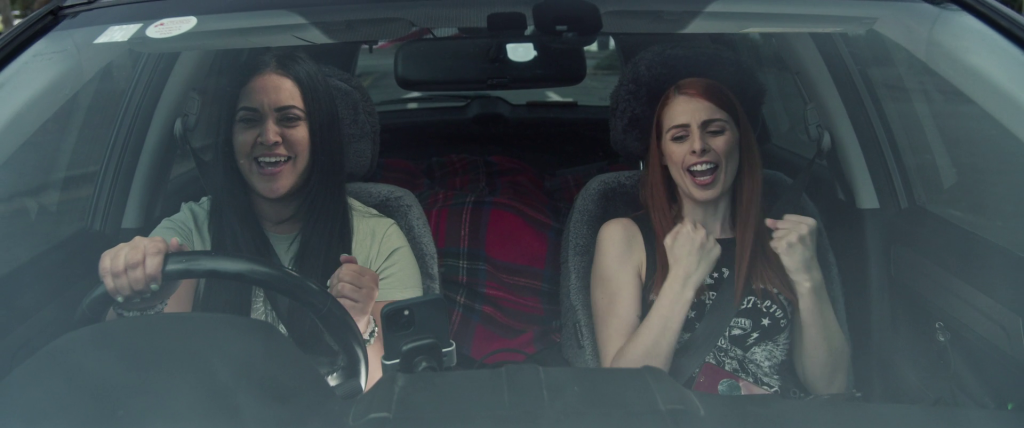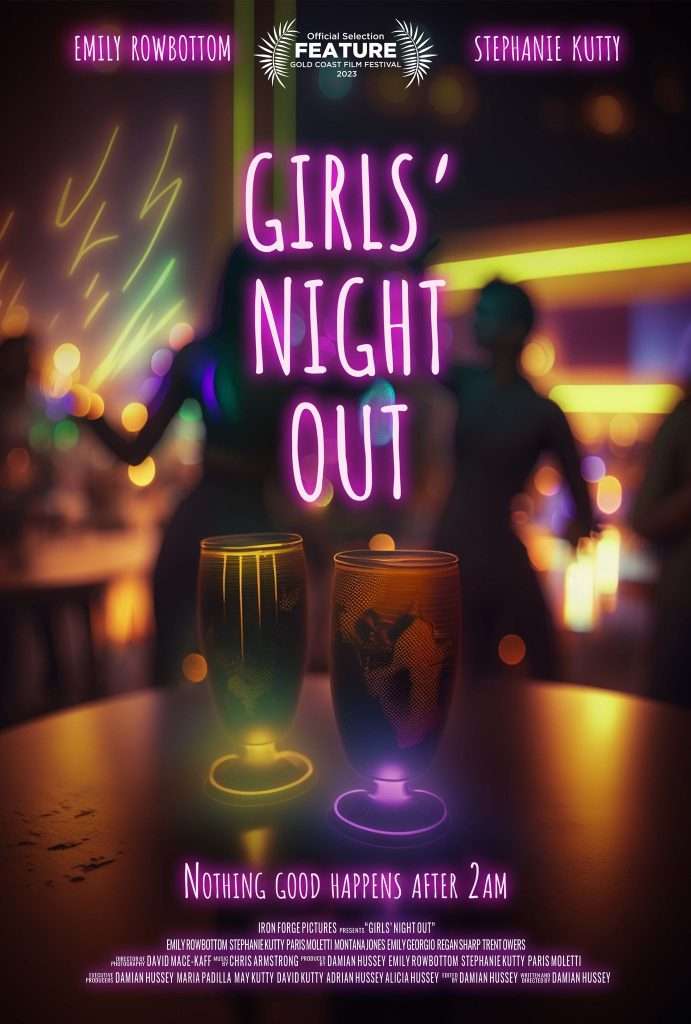Young Brie (Dakota Beaumont) and young Abby (Tehana Weston) are hanging out and experiencing their first taste of alcohol. Abby somehow stole the alcohol and claims it’s meant to make you happier. Fast forwarding to the present day, Brie (Emily Rowbottom) and Abby (Stephanie Kutty) are now adults and remain best friends. While they are sitting in a park discussing all things relating to relationships and the future, Abby checks her e-mails and discovers an exciting new job offer as a junior architect.
However, Brie is unsure of the role. Regardless, Abby suggests that they should celebrate the offer by spending the evening drinking heavily and partying late. Brie is hesitant and claims those kinds of nights don’t end well, but she’s easily convinced. The two agree to spend their evening filled with wild celebrations, but first, they make a quick stop at the local Bottle-O and briefly hang at Abby’s home to share a few pre-drinks. Next stop, the clubs! While celebrating in a local nightclub, they are joined by another friend, Holly (Montana Jones), a drug-dealing party girl. Abby does something sneaky, inviting Marcus (Paris Moletti), Brie’s current love interest, to join them. While Brie and Abby bump into friends and familiar faces throughout their night, they also encounter some of their old enemies from the past, such as Big Red (Emily Georgiou), who decides to make various harsh remarks.

Girls’ Night Out is best described as a comedy, but the film is also a heavy drama. Two friends going out to celebrate may seem harmlessly fun, but various interactions and poor choices can have disastrous and heartbreaking consequences. The film carries a strong message bound to shock viewers but leaves them with a deep thought that I’m confident will linger.
Performance-wise, I enjoyed seeing Emily Rowbottom and Stephanie Kutty as Brie and Abby. They’re both convincing when it comes to their long-term friendship. They talk on a personal level, but they also gladly throw various rude insults at each other and laugh it off. Throughout the evening, Brie and Abby do consume large amounts of alcohol and later take drugs, which only leads to them changing the way they act and speak. The film style also gets high praise. Everything here is stunning, even during dark scenes; everything is shot and presented wonderfully, thanks to the director Damian Hussy (who also serves as the film’s Writer and Producer).
The film includes various themes that are relevant and important regardless of your personal experiences. As a plot, plenty of moments are genuinely touching and gripping. Some moments are also so real and accurate that you can’t help but laugh. One example is when Brie buys the same drink from the bar, but every time she pays for it, it’s a different price, almost as if it’s just made up. Some moments make you uncomfortable, too, such as when Brie and Abby are unsure if someone slipped something in their friend’s drink and begin to doubt and question their trust in those around them. As for any issues with the film, a couple of slower scenes occur throughout, and some side performances have unnatural and unfitting dialogue. Some gags here are random and fun, but some jokes could have worked better. Some silly conversations overstay their welcome.
[mailerlite_form form_id=1]Overall, if you’ve ever lived a lifestyle of late-night partying and drinking heavily, it’s easy to say you may relate to this film. While I’ve never been a heavy drinker personally, there’s still plenty to admire on-screen, such as the multiple relatable themes. I admired the way themes such as friendships, violence, and how poor choices can carry terribly life-changing consequences were represented. The leading performances from both actresses, Emily Rowbottom and Stephanie Kutty, are great, and their characters are compelling. I also enjoyed seeing their performances change dramatically as the evening progressed. It’s a film that clearly understands the current drinking culture within Australia, and you can feel the passion coming out from behind the camera. The ending and current true stats are enough to leave audiences both surprised and shocked, plus I’m confident audiences will leave the cinema thinking on a deeper level. There’s a powerful and important message here, and it’s easily the film’s most significant praise point.
5.7/10
13th April 2022
Written by Peter Walkden


WALKDEN ENTERTAINMENT
PODCASTS ARE AVAILABLE!



0 Comments